Near Galkayo, Somalia
06 October 2009
| Watch slideshow of Alisha Ryu's pictures |
The United Nations is warning that years of drought and conflict are pushing many regions of Somalia toward a new cycle of hunger, devastation, and human suffering.
Worse than ever
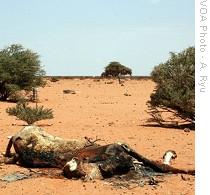 |
| Rotting carcass of camel that recently died because of Somalia's relentless drought |
In good times, the desert provides abundant food for goats and camels, which in turn provide the families with surplus milk and meat to sell in local markets. In bad times, the desert turns into a barren wasteland, challenging the survival skills of even the hardiest of people and their animals.
Abshir Ahmed, 52, has lived all his life along a stretch of the desert near the town of Docol, 38 kilometers south of Galkayo. Scratching the bone-dry earth with his bare, calloused feet, Ahmed says the devastation that he and others are experiencing now is worse than anything they have ever been through before.
He says before the rains failed more than two years ago, he had 400 goats and 20 camels. They were enough to feed himself, his wife, and 13 children. But all that is left of his livestock now are 25 goats and when they are gone, Ahmed says he does not know what he will do.
The drought, and nearly two decades of political unrest and economic neglect have left the Mudug region one of the poorest and least developed in Somalia.
Pirates establish bases
In recent years, Somali pirates have established bases in Mudug's coastal towns of Haradhere and Hobyo. But the millions of dollars they demand in ransom payments are not used to help pastoral communities and in-land towns.
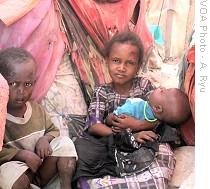 |
| Bulo Bacley's long-term residents are being squeezed for space by the daily arrival of new IDPs |
Docol town elder Sheik Ali Gab says desperate families are already pouring into his community. He estimates 80 percent of the nomadic people in the surrounding area have lost all of their livestock and they have nowhere else to go.
Fear of water shortage
Gab says the town's population is growing every day and he fears Docol could begin experiencing a severe water shortage. He says there are shallow wells in remote areas outside of Docol, but most of the wells are now dry.
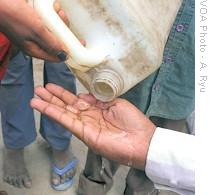 |
| There is no clean drinking water available for IDPs at Bulo Bacley, raising possibility of an outbreak of waterborne diseases |
Osman says long-term residents like her were already struggling to find enough food and water for thousands of recent arrivals from Mogadishu. She says the camp is now bursting with people from drought-affected regions as well.
For the thousands who live in Bulo Bacley, the nearest water well is three kilometers away. Cradling a dirt-covered jerry can under her arm, a heavily pregnant woman named Aisha sets off on foot from the camp to fetch her daily ration.
She says she fears the water is not fit for drinking, but there is nothing else to drink.
Underground water source
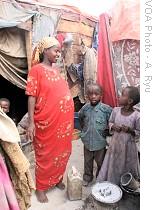 |
| Pregnant woman at Bulo Bacley IDP camp worries about future of her growing family as ongoing conflicts, climate change threaten to keep millions mired in misery and poverty |
Suleiman says what Somalia needs urgently is a comprehensive water management system.
"All we have been able to do in this area is to rehabilitate shallow wells because of access limitation and lack of funding," Suleiman said. "It is very expensive to drill bore holes in Somalia. It is a very lengthy, cumbersome process, although that is ideally the way to go. The issue is also climate change here. So, we need to do some research on the impact of climate change and how we can adapt to that. And to do that, we need a lot of geological surveys and surveys on water preservation systems. And that has not been done yet."
But Suleiman says funding shortfalls and concerns over security and violence in Somalia make it unlikely such surveys will be carried out any time soon.
Long-term solution needed
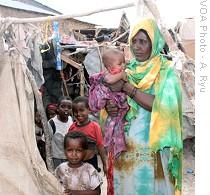 |
| A Somali mother and her children at Bulo Bacley, a long-established camp for people fleeing violence in Mogadishu |
"If they lose their livestock, they move to villages," he explained. "These small towns like Docal do not have the capacity to keep so many IDPs [internally displaced people]. So, now, young people are moving to Galkayo and they join the militias. They loot. They put up checkpoints on the road and they are part of the insecurity."
Somalia could get some relief from the drought in the coming weeks, if El Nino storms move through East Africa as expected. But heavy rainfall could also trigger massive flooding, lost livestock, and displacement, bringing more misery to millions.